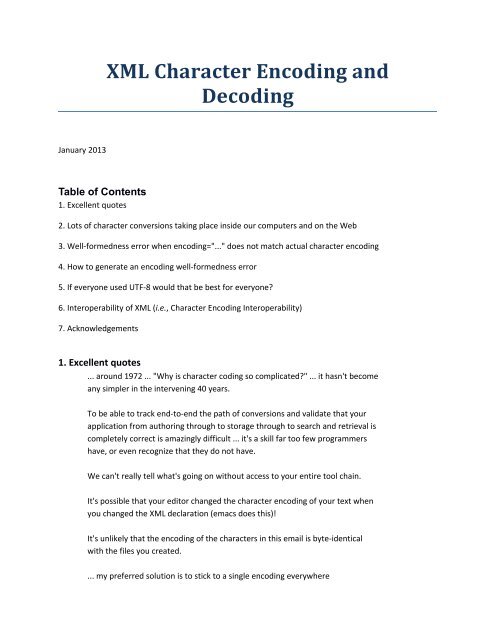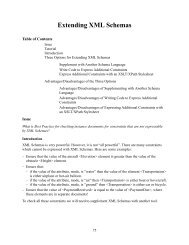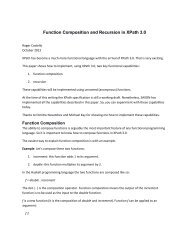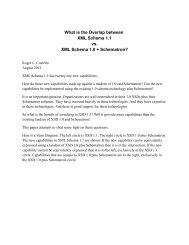XML Character Encoding and Decoding - xFront
XML Character Encoding and Decoding - xFront
XML Character Encoding and Decoding - xFront
Create successful ePaper yourself
Turn your PDF publications into a flip-book with our unique Google optimized e-Paper software.
<strong>XML</strong> <strong>Character</strong> <strong>Encoding</strong> <strong>and</strong><br />
<strong>Decoding</strong><br />
January 2013<br />
Table of Contents<br />
1. Excellent quotes<br />
2. Lots of character conversions taking place inside our computers <strong>and</strong> on the Web<br />
3. Well-formedness error when encoding="..." does not match actual character encoding<br />
4. How to generate an encoding well-formedness error<br />
5. If everyone used UTF-8 would that be best for everyone?<br />
6. Interoperability of <strong>XML</strong> (i.e., <strong>Character</strong> <strong>Encoding</strong> Interoperability)<br />
7. Acknowledgements<br />
1. Excellent quotes<br />
... around 1972 ... "Why is character coding so complicated?" ... it hasn't become<br />
any simpler in the intervening 40 years.<br />
To be able to track end-to-end the path of conversions <strong>and</strong> validate that your<br />
application from authoring through to storage through to search <strong>and</strong> retrieval is<br />
completely correct is amazingly difficult ... it's a skill far too few programmers<br />
have, or even recognize that they do not have.<br />
We can't really tell what's going on without access to your entire tool chain.<br />
It's possible that your editor changed the character encoding of your text when<br />
you changed the <strong>XML</strong> declaration (emacs does this)!<br />
It's unlikely that the encoding of the characters in this email is byte-identical<br />
with the files you created.<br />
... my preferred solution is to stick to a single encoding everywhere
... I vote for UTF-8 ...<br />
... make sure every single link in the chain uses that encoding.<br />
2. Lots of character conversions taking place inside our computers <strong>and</strong> on<br />
the Web<br />
All of the characters in the following <strong>XML</strong> are encoded in iso-8859-1:<br />
<br />
López<br />
Now consider this problem:<br />
Suppose we search the <strong>XML</strong> for the string López,<br />
where the characters in López are encoded in UTF-8.<br />
Will the search application find a match?<br />
I did the search <strong>and</strong> it found a match.<br />
How did it find a match?<br />
The underlying byte sequence for the iso-8859-1 López is: 4C F3 70 65 7A (one byte -- F3 -- is used to<br />
encode ó).<br />
The underlying byte sequence for the UTF-8 López is: 4C C3 B3 70 65 7A (two bytes -- C3 B3 -- are used<br />
to encode ó).<br />
The search application cannot be doing a byte-for-byte match, else it would find no match.<br />
The answer is that the search application either converted the <strong>XML</strong> to UTF-8 or converted the search<br />
string (López) to iso-8859-1.<br />
Inside our computers, inside our software applications, <strong>and</strong> on the Web there is a whole lot of character<br />
encoding conversions occurring ... transparently ... without our knowing.
3. Well-formedness error when encoding="..." does not match actual character<br />
encoding<br />
Create an <strong>XML</strong> document <strong>and</strong> encode all the characters in it using UTF-8:<br />
López<br />
Add an <strong>XML</strong> declaration <strong>and</strong> specify that the encoding is iso-8859-1:<br />
<br />
López<br />
There is a mismatch between what encoding="..." says <strong>and</strong> the actual encoding of the characters in the<br />
document.<br />
Check the <strong>XML</strong> document for well-formedness <strong>and</strong> you will NOT get an error.<br />
Next, create the same <strong>XML</strong> document but encode all the characters using iso-8859-1:<br />
López<br />
Add an <strong>XML</strong> declaration <strong>and</strong> specify the encoding is UTF-8:<br />
<br />
López<br />
Again there is a mismatch between what encoding="..." says <strong>and</strong> the actual encoding of the characters<br />
in the document.<br />
But this time when you check the <strong>XML</strong> document for well-formedness you WILL get an error.<br />
Here's why.<br />
In UTF-8 the ó symbol is encoded using these two bytes: C3 B3<br />
In iso-8859-1, C3 <strong>and</strong> B3 represent two perfectly fine characters, so the UTF-8 encoded <strong>XML</strong> is a fine<br />
encoding="iso-8859-1" document.<br />
In iso-8859-1 the ó symbol is encoded using one byte: F3<br />
F3 is not a legal UTF-8 byte, so the iso-8859-1 encoded <strong>XML</strong> fails as an encoding="UTF-8" document.
4. How to generate an encoding well-formedness error<br />
George Cristian Bina from oXygen <strong>XML</strong> gave the scoop on how things work inside oXygen.<br />
a. Create an <strong>XML</strong> document <strong>and</strong> encode all the characters in it using iso-8859-1:<br />
<br />
López<br />
b. Using a hex editor, change encoding="iso-8859-1" to encoding="utf-8":<br />
<br />
López<br />
c. Drag <strong>and</strong> drop the file into oXygen.<br />
d. oXygen will generate an encoding exception:<br />
Cannot open the specified file. Got a character<br />
encoding exception [snip]<br />
George described the encoding conversions that occur inside oXygen behind-the-scenes:<br />
If you have an iso-8859-1 encoded <strong>XML</strong> file loaded into oXygen<br />
<strong>and</strong> change encoding="iso-8859-1" to encoding="utf-8" then<br />
oXygen will automatically change the encoding of every character<br />
in the document to UTF-8.<br />
George also made this important comment:<br />
Please note that the encoding is important only when the file is loaded<br />
<strong>and</strong> saved. When the file is loaded the bytes are converted to characters<br />
<strong>and</strong> then the application works only with characters. When the file is<br />
saved then those characters need to be converted to bytes <strong>and</strong> the<br />
encoding used will be determined from the <strong>XML</strong> header with a default to<br />
UTF-8 if no encoding can be detected.<br />
5. If everyone used UTF-8 would that be best for everyone?<br />
There are a multiplicity of character encodings <strong>and</strong> a huge number of character encoding conversions<br />
taking place behind-the-scene. If everyone used UTF-8 then there would be no need to convert<br />
encodings.
Suppose every application, every IDE, every text editor, <strong>and</strong> every system worldwide used one character<br />
encoding, UTF-8.<br />
Would that be a good thing?<br />
The trouble with that is that UTF-8 makes larger files than UTF-16 for great numbers of people who use<br />
ideographic scripts such as Chinese. The real choice for them is between 16 <strong>and</strong> 32.<br />
UTF-16 is also somewhat harder to process in some older programming languages, most notably C <strong>and</strong><br />
C++, where a zero-valued byte (NUL, as opposed to the zero-valued machine address, NULL) is used as a<br />
string terminator.<br />
So UTF-8 isn't a universal solution.<br />
There isn't a single solution today that's best for everyone.<br />
See this excellent discussion on StackOverflow titled, Should UTF-16 be Considered Harmful?<br />
http://programmers.stackexchange.com/questions/102205/should-utf-16-be-considered-harmful<br />
In that discussion one person wrote:<br />
After long research <strong>and</strong> discussions, the development<br />
conventions at my company ban using UTF-16 anywhere<br />
except OS API calls ...<br />
6. Interoperability of <strong>XML</strong> (i.e., <strong>Character</strong> <strong>Encoding</strong> Interoperability)<br />
Remember not long ago you would visit a web page <strong>and</strong> see strange characters like this:<br />
“Good morning, Daveâ€<br />
You don't see that much anymore.<br />
Why?<br />
The answer is this:<br />
Interoperability is getting better.<br />
In the context of character encoding <strong>and</strong> decoding, what does that mean?
Interoperability means that you <strong>and</strong> I interpret (decode) the bytes in the same way.<br />
Example: I create an <strong>XML</strong> file, encode all the characters in it using UTF-8, <strong>and</strong> send the <strong>XML</strong> file to you.<br />
Here is a graphical depiction (i.e., glyphs) of the bytes that I send to you:<br />
López<br />
You receive my <strong>XML</strong> document <strong>and</strong> interpret the bytes as iso-8859-1.<br />
In UTF-8 the ó symbol is a graphical depiction of the "LATIN SMALL LETTER O WITH ACUTE" character<br />
<strong>and</strong> it is encoded using these two bytes: C3 B3<br />
But in iso-8859-1, the two bytes C3 B3 is the encoding of two characters:<br />
C3 is the encoding of the à character<br />
B3 is the encoding of the ³ character<br />
Thus you interpret my <strong>XML</strong> as:<br />
López<br />
We are interpreting the same <strong>XML</strong> (i.e., the same set of bytes) differently.<br />
Interoperability has failed.<br />
So when we say:<br />
Interoperability is getting better.<br />
we mean that the number of incidences of senders <strong>and</strong> receivers interpreting the same bytes differently<br />
is decreasing.<br />
Let's revisit our first example, you open a document <strong>and</strong> see this:<br />
“Good morning, Daveâ€<br />
Here's how that happened:<br />
I created a document, using a UTF-8 editor, containing this text:<br />
“Good morning, Dave”
The left quote character is U+201C <strong>and</strong> the right quote character is U+201D.<br />
You open the document using Microsoft Word (or any Windows-1252 editor) <strong>and</strong> see:<br />
“Good morning, Daveâ€<br />
Here’s why:<br />
In UTF-8 the left smart quote is codepoint 201C, which is encoded inside the computer as these hex<br />
values: E2 80 9C<br />
In Windows-1252 the byte E2 is displayed as â <strong>and</strong> the byte 80 is displayed as € <strong>and</strong> the byte 9C is<br />
displayed as œ<br />
In UTF-8 the right smart quote is codepoint 201D, which is encoded inside the computer as these hex<br />
values: E2 80 9D<br />
In Windows-1252 the byte E2 is displayed as â <strong>and</strong> the byte 80 is displayed as € <strong>and</strong> the byte 9D has no<br />
representation<br />
7. Acknowledgements<br />
Thanks to the following people for their contributions to this paper:<br />
David Allen<br />
Roger Costello<br />
John Cowan<br />
Jim DeLaHunt<br />
Ken Holman<br />
Michael Kay<br />
David Lee<br />
Chris Maloney<br />
Liam Quin<br />
Michael Sokolov<br />
Andrew Welch<br />
Hermann Stam-Wilbr<strong>and</strong>t






